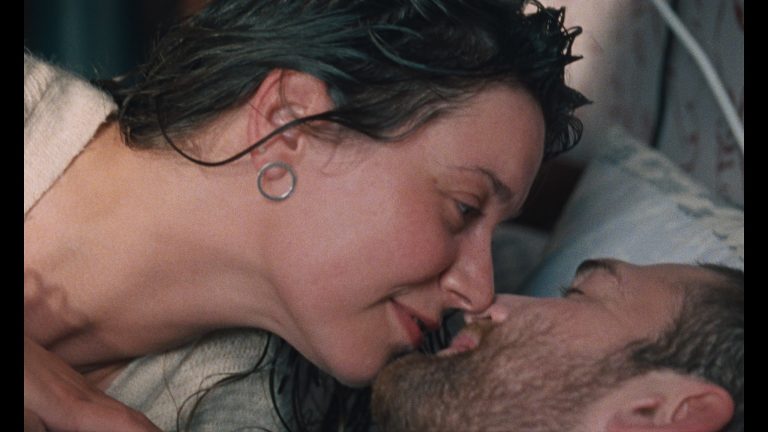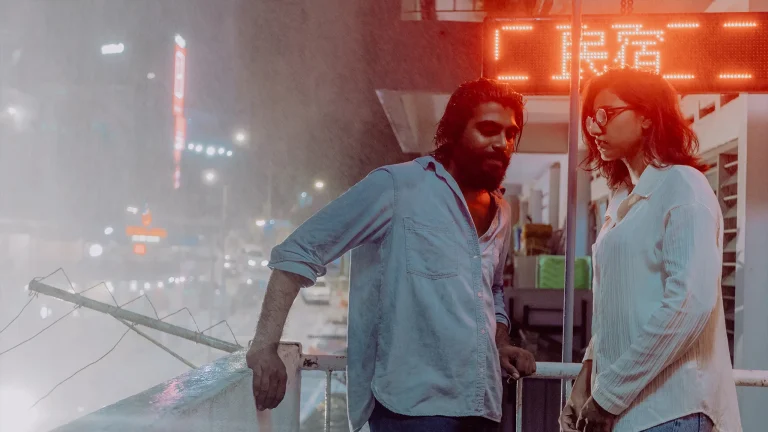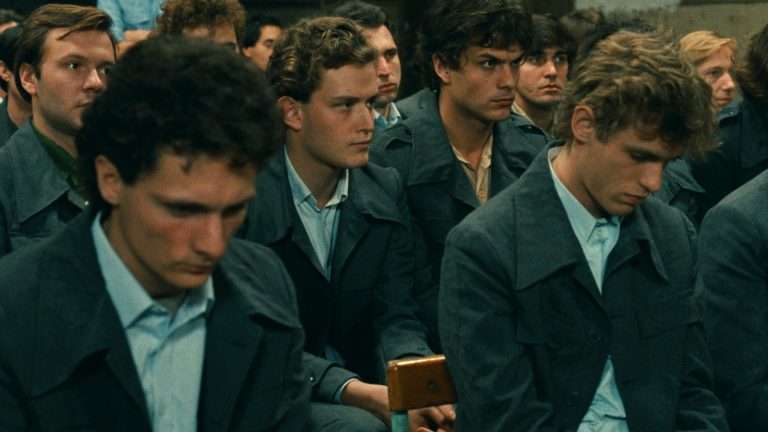Like the world’s most disturbing, backward, and morally bankrupt episode of The White Lotus, Brandon Cronenberg’s latest Sundance convener, Infinity Pool, takes an understandable, if not entirely logical next step, by dropping a few unsettling dashes of science fiction and horror into the meal that has been made of the wealthy over the last few years. If Mike White’s brilliant anthology series wants to eat the rich, Cronenberg wants to swallow them whole without even taking a moment to enjoy the flavor. At least, that’s what Infinity Pool would have us believe at first.
Unlike the HBO favorite or even Ruben Östlund’s current Best Picture contender Triangle of Sadness, Cronenberg’s fascination with hallucinogenic imagery and loose plot threads is ultimately at the expense of the road it could have taken on the way to fitting right in with its contemporaries. But what the path it does take lacks in side-winding, labyrinthine questions, it makes up for with hellish depravity that’s just uncompromising enough to give in to, as strange as it may sound.
Suppose Brandon’s previous sci-fi terrifier Possessor — or any film from his iconic father, David, for that matter — is at least something of an indication. In that case, the Cronenbergs are a filmmaking bloodline born from a shared understanding of how the human propensity to resist overwhelming and inevitable forces, more often than not, results in self-destruction. Between the two, there’s little nepotism, even little copycatting, and no need to fit in whatsoever.
If that’s not already apparent to those who have followed the work of both father and son, the younger Cronenberg leaves little room for viewers to question him in the opening moments of Infinity Pool. As cinematographer Karim Hussain shifts the camera sideways and upside down to capture the all-inclusive resort that James (Alexander Skarsgård) and Em Foster (Cleopatra Coleman) temporarily call home on the fictional island nation of Li Tolqa, the notion of a world turned on its axis is one we’re meant to take literally.
James is a struggling author living off the expendable and creatively empty pleasures of marrying into a wealthy publishing family. His last book was a dud, and he hasn’t found the motivation to finish another one in six years. Still, one can only imagine the thoughts that clutter his mind when he and Em meet another vacationing couple, Alban Bauer (Jalil Lespert) and his wife Gabi (Mia Goth), who may be the only people brave enough to admit they liked his book.
While it sounds like a recipe for a story that’s already been told several times over, and in the last few months no less, Cronenberg’s fascinations, not to mention his flair for premises that make you think about your own self, come to light when James is arrested after a secret day away from the guarded resort with the Bauers goes horribly awry. The country’s idea of prudence is stringently warped, to say the least, as James’ punishment comes down to two choices: allow himself to be executed or, if he can afford it, allow the government to create a double with all of his memories to be executed in his place, the only caveat being that James and Em have to watch the ordeal unfold.
The experience of watching James meet an untimely end is off-putting to everyone except himself, and the emotionally numb writer soon discovers he’s not the only one getting an odd kick out of this financially backed form of invincibility. With the Bauers as his guides, James is led down a rabbit hole of hedonism as he and a small group of upper-class others make the otherwise decrepit Li Tolqa their debaucherous amusement park.
It’s around this time, just about halfway through the film, that the story, much like its protagonist, is presented with two options: to either continue unraveling the fraught implications posed by a poor country willing to allow its temporary (largely white) patrons to make their own rules through the alluring power of money, or abandon all hope on a premise it has already set up in favor of a surreal depiction of one man’s descent into nightmarish madness.
It’s not that there’s a correct choice, but rather a more intriguing one. Though Infinity Pool finds a way to make it work after opting for the latter, there’s always the chance it makes for a less repetitive and stagnant experience had it stuck to its guns. If the film lacks rewatch value, it’s not entirely because of its gruesome imagery. What follows would be only a few steps shy of hollow if its two lead performers didn’t give themselves entirely to Cronenberg’s vision, if that’s what we call such a meandering structure of events.
Skarsgård’s commitment to acting is such that he feels like a newfound discovery every time he appears in something new, always a completely different manifestation than his previous role. That goes double for his work here, as his character becomes an eerily seduced shell of his former self when sex and drugs get in the way of his sanity. He has as much trepidation stepping into the role of James as he did as Prince Amleth in last year’s equally mind-expanding Viking epic The Northman, which is to say there may very well be no limit to which he’s willing to push himself.
The same can be said, and then some, for Goth as Gabi, who makes it clear to James and those of us taking in her tantalizing presence that their meeting was more than just the result of fate. Following up her dual performances in Ti West’s double feature of X and Pearl — soon to be a completed trilogy — with an unhinged role that requires a lack of restraint for even more calculated reasons makes it easy to believe that Goth will continue to be one of the most prominent performers of her generation, regardless of what genre she’s encased in. Don’t be surprised if you question whether naming your son “James” sounds like such a good idea after all.
In fact, the high-pitched wickedness with which Goth could make such a name, the sound of a spectral haunting, perfectly sums up what Infinity Pool can salvage from its frustrating diversions. Though its later sequences ultimately cannot match the thought-provoking nature of its initial conceit, Cronenberg’s talent behind the camera is strong enough that the film remains typically unsettling in even the most incoherent of packages. And when you have the right actors giving the thinly drawn characters some much-needed nuance, a story that’s only halfway to greatness can, indeed, be met halfway.


![Arrival [2016] : A Stunning Achievement](https://79468c92.delivery.rocketcdn.me/wp-content/uploads/2016/11/maxresdefault-1-768x512.jpg)




![Sanson and Me [2022]: ‘Tribeca’ Review – On Earth, We’re Briefly Gorgeous](https://79468c92.delivery.rocketcdn.me/wp-content/uploads/2022/06/SANSON-AND-ME-Tribeca-Movie-Review-2-768x432.jpg)